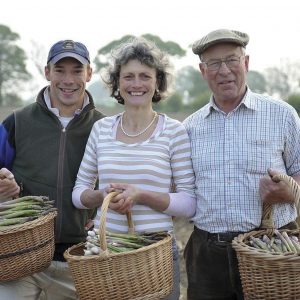Nature’s finest hangover cure
The Romans had a special asparagus fleet, the Greeks worshipped it and even the ancient Egyptians had a go at cultivating nature’s finest sprouting vegetable.
Aparagus, one of our favourite spring vegetables. A flowering perennial which was once classified as a lily, like its cousins the onions and garlic. It has been used as a vegetable and medicine since 3000BC owing to its delicate flavour and diuretic properties amongst other things.
Greeks and Romans ate it fresh whilst in season and dried it for winter consumption. The Romans would even freeze it high in the Alps for the Feast of Epicurus, which was held in mid January. The word asparagus comes even comes from the Greek language meaning ‘sprout’ or ‘shoot’.
The graceful green spears of asparagus plant have have always been revered as a sign of elegance and deemed a delicacy which only the wealthy could afford. The Romans went to great lengths to have asparagus on the menu throughout the year and Emperor Augustus was so fond of it that he kept a special asparagus fleet just to fetch it. A recipe for asparagus appears in the oldest surviving book of recipes, Apicius from the third century, meaning refined love of food. Julius Ceasar first ate it in Lombardy and asked for it to be served with melted butter.
It wasn’t until the 16th century that asparagus gained popularity in France and Britain and then introduced to America from colonists on their journeys. Quickly adopted as a delicacy in France by King Louis XIV, who was so fond of it that he ordered special greenhouses to be built so he to could enjoy it all year round.
One of my most interesting and amusing discoveries about asparagus is that South Korean scientists discovered that it can even help with hangovers. The image of a load of drunken people munching on asparagus spears being prodded, poked and attached to clinical machines is one that never fails to bring a smile to my face. Apparently it’s something to do with enzymes and breaking down the alcohol in your blood system!
The ancient Greeks loved them and the word ‘asparagus’ is actually greek for ‘sprout’ or ‘shoot’.
The water from cooked asparagus may help clean blemishes on the face if used morning and night, imagine how your sheets would smell! A great help for curing your gout, that should keep you on your toes. It even helps with hypertension and help evacuate your bowel – should there be an emergency in there!
Today, asparagus is widely cultivated and much loved by food lovers around the world for its versatility, unique herbaceous flavour and distinctive shape. Loved for its health giving properties, it is packed with vitamins B, C and potassium, it is also emerging from research that it contains antioxidants which are helping to protect the body against future disease, a pretty impressive vegetable – even if it does make your pee stink!
The asparagus shoots are only eaten as a young shoot as once the bud starts to open and flower it quickly becomes woody and of no use in the kitchen. Prepared and served in a number of ways all around the world, Asians like to stir fry it as they also do in the United States, grilled over charcoal or used in stews and soups, some even pickle it. It is also regaining popularity in our health conscious society eaten raw in salads.
Our British asparagus season is short and demand for local produce ensures that it commands a premium price. Traditionally the asparagus season starts on 23 April and ends on Midsummers Day and this year has been a struggle for the growers and it’s not over yet as the weather has taken another turn for the worse! This really is the ingredient that kicks in spring for chefs and we all share your frustrations with the lost month but we are now nearly there, fingers crossed.
James Wellock of Wellocks, says, “It is a perfect example of how local produce has become increasingly important over the last five or so years. Demand is high from every kitchen we deliver to and the recognition is that our product, yes the green English asparagus is the best that you can buy in the world.” James goes on to say, “I also believe that we have four of the best growers in England and each bring a little point of difference that lets us cover every eventuality and need for chefs.”
It has become clear that after travelling all over Europe and on a recent trip to France that it is the history and passion of the grower, coupled together with the climate and soil which are the ingredients that go into making the magic of this most perfect of ingredients.
YORKSHIRE GROWERS
Ronda & Richard Morrit

After Ronda and Richard had their first baby, Ronda wanted a job where she could work from home, her first thoughts were to consider strawberry picking until an advisor suggested that their land was perfect for growing asparagus. A decision to try was quickly made and with little idea of what they were doing they planted their first acre of asparagus in 1997. Only a few bunches were produced and sold at the farm gate, people snapped them up and were asking for more. The business grew quickly from early on and now with 14 acres of green spears, they sell not only from the farm gate but to greengrocers and wholesalers like Wellocks. “Freshness is crucial”, says Ronda, “Once you’ve cut the spear from the plant, the sugars start turning to carbohydrate, so you begin to get that floury taste. But if you eat it when it’s fresh, it’s as sweet as sweet.”
Richard Spilman

Having grown soft fruit for many years, in 2005 Richard Spilman decided to diversify further and planted an acre of asparagus to be harvested in late April/May, filling the gap between lambing and picking strawberries. Initially two varieties were grown, and a system of picking, grading and packing was established. Encouraged by the enthusiastic response of their customers, Richard and his wife Sally planted another acre, with a further acre two years later. Five acres of asparagus is now grown, most of which is the variety Gijnlim which produces strong, good looking spears with a flavour to match. Asparagus responds very keenly to changes in temperature and grows very rapidly on a warm, sunny day, and even more so if the night temperatures are mild. At times, it almost seems to grow in front of your eyes! At last the 2013 season is under way and despite difficult conditions, the spears are looking and tasting good. Richard and Sally have now been joined by their eldest son Tom ensuring a long future for Spilman’s Yorkshire asparagus.



Recent Comments